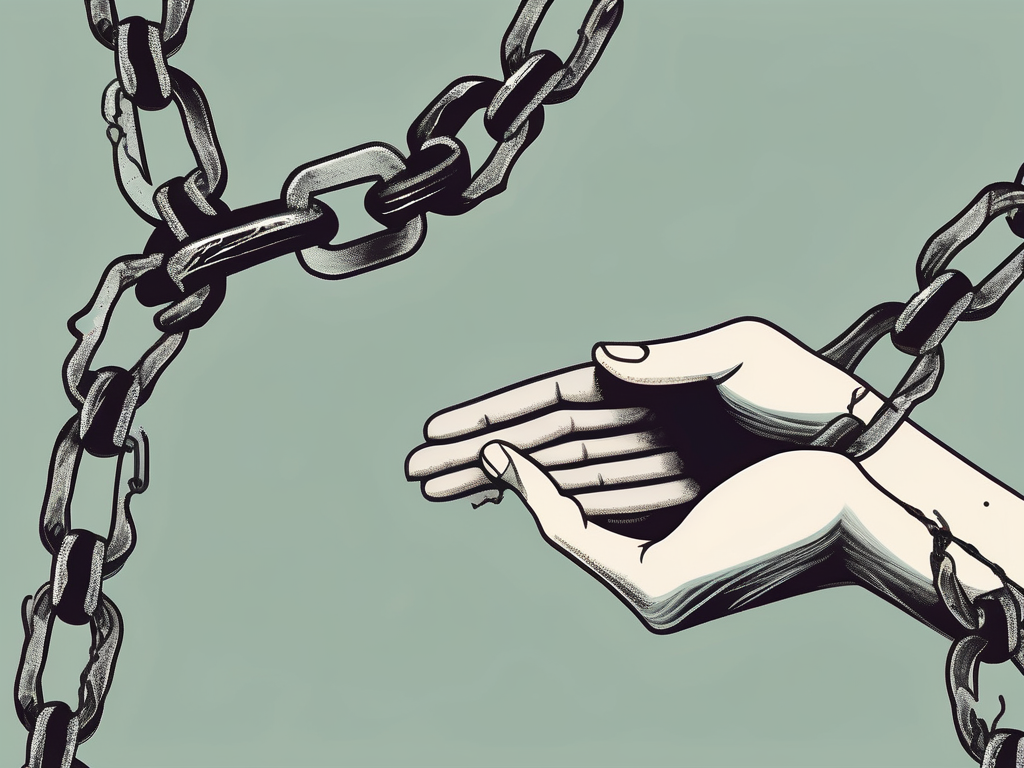Forgiving yourself is a concept that holds immense significance in Christianity. It is a topic that is often overlooked or misunderstood, but it plays a crucial role in the life of a believer. To truly understand self-forgiveness within a biblical context, it is essential to delve into the core teachings of Christianity and explore the different perspectives the Bible offers on this subject. In this article, we will explore biblical definitions of forgiveness and examine the importance of forgiveness in Christian life. We will also address the misconceptions surrounding self-forgiveness and provide practical steps towards achieving self-forgiveness according to the Bible. Finally, we will explore the impact of self-forgiveness on a Christian’s spiritual growth and their relationships with others.
Understanding the Concept of Forgiveness in Christianity
Forgiveness is a central theme in Christianity, as it reflects the very essence of God’s character. In the Bible, forgiveness is defined as the act of pardoning someone for their offenses or sins. It involves releasing resentment and extending mercy to the offender, just as God has forgiven us through the sacrifice of Jesus Christ on the cross.
Furthermore, forgiveness in Christianity goes beyond a mere act of pardoning. It is a transformative process that brings healing and restoration to both the forgiver and the forgiven. It is an essential practice that enables believers to experience God’s redemptive love and live in harmony with others.
Biblical Definitions of Forgiveness
The Bible provides several definitions of forgiveness that shed light on its multi-faceted nature. Firstly, forgiveness is described as an act of canceling a debt. Just as God forgives our debts and sets us free from the burden of sin, we are called to extend the same grace and forgiveness to ourselves.
Moreover, forgiveness is portrayed as an act of letting go and releasing the offender from the consequences of their actions. It involves choosing not to hold the offense against them and entrusting justice to God. By forgiving ourselves, we embrace God’s justice and allow Him to heal our wounded hearts.
Lastly, forgiveness is seen as an act of love. In 1 Corinthians 13:5, we are reminded that love keeps no record of wrongs. By forgiving ourselves, we demonstrate love not only towards ourselves but also towards God and others.
The Importance of Forgiveness in Christian Life
Forgiveness is woven into the very fabric of Christian life, offering countless benefits to those who embrace it. It is essential for believers to understand the significance of forgiving themselves and others in order to live a truly fulfilling Christian life.
Firstly, forgiveness releases us from the bondage of guilt and shame. When we hold onto unforgiveness towards ourselves, we are burdened by our mistakes, preventing us from experiencing God’s grace and mercy fully. By forgiving ourselves, we open ourselves to God’s healing and restoration, allowing His love to transform our lives.
Secondly, forgiveness enables spiritual growth. It fosters humility, compassion, and empathy within us, molding us into the image of Christ. As we extend forgiveness to ourselves, we learn to extend it to others, cultivating healthy and loving relationships that reflect God’s love.
Moreover, forgiveness is not just a one-time event but a continuous process. It requires us to constantly examine our hearts and let go of any lingering resentment or bitterness. By doing so, we create space for God’s love and peace to dwell within us.
Furthermore, forgiveness is not limited to forgiving others for their wrongdoings. It also involves forgiving ourselves for our own mistakes and shortcomings. Often, we are our harshest critics, holding onto guilt and self-condemnation. However, God’s forgiveness is all-encompassing, extending to every aspect of our lives. When we forgive ourselves, we align our hearts with God’s grace and allow His transformative power to work in us.
Additionally, forgiveness is a powerful tool for reconciliation. It has the ability to mend broken relationships and restore harmony. When we extend forgiveness to others, we create an opportunity for healing and growth, both individually and collectively. It is through forgiveness that we can experience the true beauty of reconciliation and the restoration of broken bonds.
Moreover, forgiveness is not a sign of weakness but of strength. It takes courage to let go of past hurts and choose to forgive. It requires us to rise above our pain and embrace the freedom that forgiveness brings. By forgiving others, we break the cycle of hurt and resentment, paving the way for a brighter future.
Lastly, forgiveness is a reflection of God’s character within us. As Christians, we are called to imitate Christ and embody His love and forgiveness. By extending forgiveness to others, we demonstrate the transformative power of God’s grace and invite others to experience His love.
In conclusion, forgiveness is a fundamental aspect of Christianity that goes beyond a mere act of pardoning. It is a transformative process that brings healing, restoration, and reconciliation. It releases us from the bondage of guilt and shame, enables spiritual growth, and reflects the very essence of God’s character. As believers, it is essential for us to embrace forgiveness, both towards others and ourselves, in order to live a truly fulfilling Christian life.
Biblical Perspectives on Self-Forgiveness
Now that we have explored the broader concept of forgiveness in Christianity, let us examine biblical perspectives on self-forgiveness. While the term “self-forgiveness” may not be explicitly mentioned in the Bible, we can find insights and teachings that guide us towards forgiving ourselves in both the Old and New Testaments.
Self-forgiveness is a complex and deeply personal journey that many individuals face. It involves acknowledging our own mistakes, finding healing, and ultimately extending grace and forgiveness to ourselves. The Bible offers wisdom and guidance for this process, showing us that self-forgiveness is not only possible but also essential for our spiritual growth.
Old Testament Views on Self-Forgiveness
In the Old Testament, we see examples of individuals who struggled with guilt and shame yet found solace and forgiveness in God. King David, for instance, experienced deep remorse after his affair with Bathsheba and his involvement in Uriah’s death. In Psalm 51, he pours out his repentant heart to God, acknowledging his sins and pleading for forgiveness. This psalm provides a framework for acknowledging our faults, seeking God’s forgiveness, and receiving His cleansing.
David’s story reminds us that self-forgiveness begins with genuine repentance and a humble heart. It requires us to confront our wrongdoings, take responsibility for our actions, and turn to God for forgiveness. Through David’s example, we learn that God’s mercy and grace are available to all who seek them, including ourselves.
The story of Joseph also demonstrates self-forgiveness in the Old Testament. After being sold into slavery by his brothers, Joseph forgave them and saw God’s hand in the midst of his suffering. He recognized the bigger picture of God’s plan and embraced forgiveness, ultimately reconciling with his brothers and bringing restoration to his family.
Joseph’s journey towards self-forgiveness teaches us the power of letting go of resentment and bitterness. Despite the pain and betrayal he experienced, Joseph chose to forgive, allowing God to work through his circumstances for good. His story reminds us that self-forgiveness is not only about releasing ourselves from guilt but also about finding reconciliation and healing in our relationships.
New Testament Teachings on Self-Forgiveness
In the New Testament, Jesus teaches about forgiveness extensively. He emphasizes the importance of forgiving others in the Lord’s Prayer, stating, “Forgive us our debts, as we also have forgiven our debtors” (Matthew 6:12). This prayer reminds us of our constant need for forgiveness and challenges us to extend the same forgiveness to others, including ourselves.
Jesus’ teachings on forgiveness highlight the interconnectedness of forgiving others and forgiving ourselves. He invites us to recognize our own imperfections and extend grace to ourselves, just as we would to those who have wronged us. Self-forgiveness, therefore, becomes an act of obedience to Christ’s command to love one another and forgive as we have been forgiven.
Furthermore, Jesus’ sacrificial death on the cross serves as the ultimate demonstration of forgiveness. His blood shed for our sins offers us complete redemption and forgiveness when we believe in Him. Through Jesus, we find the power to forgive ourselves and others, as we experience the depth of God’s forgiveness and love.
Self-forgiveness is not always easy. It requires vulnerability, humility, and a willingness to let go of the past. However, the biblical perspectives on self-forgiveness remind us that it is a necessary step towards healing and restoration. As we embrace God’s forgiveness and extend it to ourselves, we can experience the freedom and peace that come from being reconciled with our own hearts and with God.
Misconceptions About Self-Forgiveness in the Bible
Despite the biblical teachings on forgiveness, there are often misconceptions and misunderstandings surrounding self-forgiveness. It is essential to address these misconceptions and debunk common myths that may hinder believers from experiencing the freedom that self-forgiveness brings.
Debunking Common Misunderstandings
One common misconception is that forgiving ourselves means forgetting our past mistakes. However, self-forgiveness does not imply erasing the memory of our actions. Instead, it involves accepting our past, learning from it, and allowing God’s forgiveness to shape our future.
Another misunderstanding is that self-forgiveness is selfish or self-centered. On the contrary, self-forgiveness is an act of humility and surrender to God’s grace. It enables us to extend the same forgiveness we have received to ourselves, empowering us to love and serve others selflessly.
The Role of Guilt and Shame in Forgiveness
Guilt and shame often hinder individuals from forgiving themselves. However, it is crucial to understand that guilt and shame are not synonymous with repentance and forgiveness. While guilt reminds us of our sins, leading us to seek reconciliation, shame seeks to condemn and destroy our identity in Christ.
When we truly repent and seek God’s forgiveness, He removes our guilt and shame, replacing it with His love and acceptance. It is vital to align our thoughts and beliefs with God’s truth, embracing the forgiveness He offers and forgiving ourselves in the process.
Steps Towards Self-Forgiveness According to the Bible
While the journey towards self-forgiveness may seem challenging, the Bible provides practical steps to guide us in this process. These steps are not meant to trivialize our pain or minimize the impact of our mistakes but to offer a path of healing and restoration.
Acknowledging and Confessing Sins
The first step towards self-forgiveness is acknowledging our sins and shortcomings honestly. We need to examine our hearts and confront the areas where we have fallen short. By confessing our sins to God, we open the door for His forgiveness and receive His cleansing and healing.
Moreover, it is essential to seek forgiveness from those we have wronged whenever possible. This step allows for reconciliation and restoration of broken relationships, fostering a deeper sense of self-forgiveness and healing.
Seeking God’s Forgiveness
Once we have acknowledged our sins, we must actively seek God’s forgiveness. It is vital to understand that God’s forgiveness is not conditional; it is freely offered to all who genuinely repent and believe in Jesus Christ as their Savior.
Through prayer and seeking God’s presence, we can experience His forgiveness and accept His grace. This step involves surrendering our guilt and shame to Him, trusting in His unfailing love and receiving His forgiveness with open hearts.
Embracing God’s Grace and Mercy
As we seek God’s forgiveness, it is crucial to embrace His grace and mercy fully. We must internalize the truth that God’s forgiveness is complete, covering all our past, present, and future sins. His grace is sufficient to cleanse us from all unrighteousness and enable us to forgive ourselves.
Embracing God’s grace and mercy also involves renewing our minds with His Word. We must immerse ourselves in the promises and truths of the Bible, reminding ourselves of the forgiveness and love that God freely offers.
The Impact of Self-Forgiveness on Christian Life
Self-forgiveness has profound implications for a Christian’s spiritual growth and their relationships with others. It is not merely an abstract concept but a tangible practice that transforms lives and aligns believers with God’s purposes.
Spiritual Growth and Self-Forgiveness
Self-forgiveness is an integral part of our spiritual growth journey. It enables believers to move forward from past mistakes and live in the freedom that Christ has called them to. When we forgive ourselves, we allow God to work in our lives, shaping us into vessels that bear His love, compassion, and forgiveness to those around us.
Moreover, self-forgiveness allows us to experience the fullness of God’s love and grace. It leads to a deeper understanding of our value and worth in Him and strengthens our relationship with Him. As we embrace self-forgiveness, we find healing, restoration, and a renewed sense of purpose in our Christian walk.
The Connection Between Self-Forgiveness and Loving Others
Self-forgiveness also plays a significant role in our relationships with others. When we cultivate a forgiving heart towards ourselves, we become more capable of extending forgiveness and love to those who have wronged us.
Self-forgiveness eliminates the barriers that hinder our ability to love others genuinely. It helps us release resentments, heal wounds, and foster healthy connections. By forgiving ourselves, we create space for compassion, empathy, and forgiveness towards others, ultimately reflecting God’s love in our interactions.
Conclusion
In conclusion, the Bible offers profound insights into the concept of self-forgiveness in Christianity. It reminds us of the importance of forgiveness and the transformative power it holds for both the forgiver and the forgiven. By understanding biblical definitions of forgiveness, addressing misconceptions, and following practical steps outlined in Scripture, we can experience the healing and freedom that self-forgiveness brings. Self-forgiveness plays a pivotal role in our spiritual growth and impacts our relationships with God and others. Let us, therefore, embrace the forgiveness that God offers and extend it to ourselves, living lives rooted in His grace and love.












